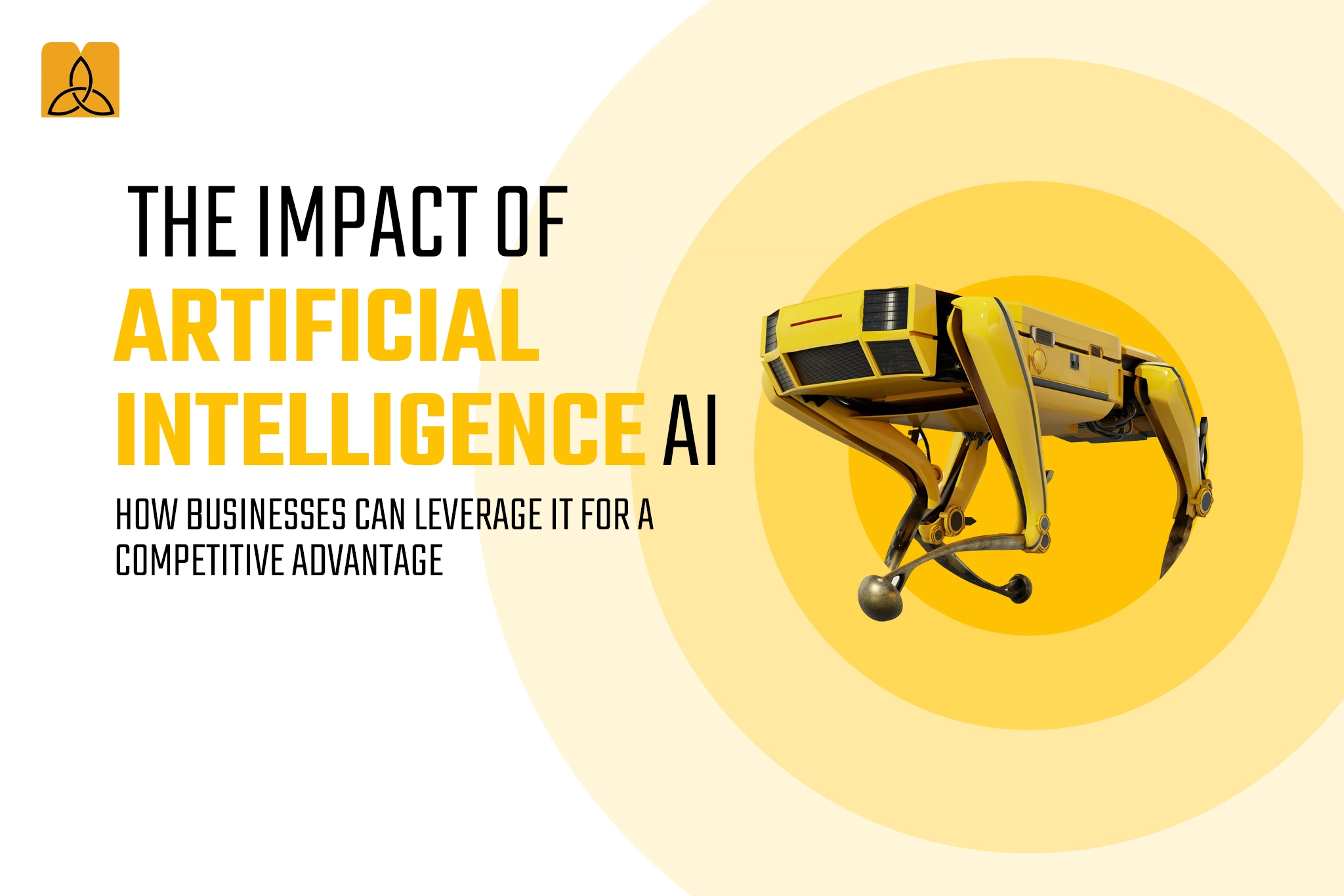Leveraging AI for Competitive Advantage in Morden Business

Leveraging AI for Competitive Advantage : Artificial intelligence (AI) has transformed businesses’ operations, and digital marketing is no exception. AI-powered technologies have revolutionized digital marketing by enabling enterprises to improve customer engagement, personalize marketing campaigns, and optimize performance. This blog post aims to examine the influence of AI on digital marketing and how businesses can use it to enhance their competitive edge.
Customer Segmentation and Personalization
AI-powered technologies have made it easier for businesses to segment customers based on their interests, preferences, and behavior. AI can identify patterns and trends by analyzing customer data, allowing companies to create personalized marketing campaigns. This, in turn, increases customer engagement and conversion rates. For example, Netflix uses AI to analyze viewers’ watch history and recommend personalized content, increasing customer retention and satisfaction.
Chatbots and Virtual Assistants
Chatbots and virtual assistants are AI-powered technologies that can communicate with customers in real-time, providing personalized assistance and support. Chatbots can answer common customer queries, resolve issues, and even process orders. They are available 24/7, providing customers with immediate service, which can improve customer satisfaction and loyalty. For instance, H&M uses a chatbot to help customers with their shopping experience, providing personalized recommendations and assistance.
Predictive Analytics
Predictive analytics uses AI to analyze customer data, predicting future behaviors and outcomes. Businesses can identify potential leads, customer churn, and market trends by analyzing customer data. It helps companies to optimize their marketing campaigns and increase conversion rates and revenue. For instance, Amazon uses predictive analytics to recommend products based on customers’ purchase history and browsing behavior, growing sales and customer satisfaction.
Optimization and Automation
AI-powered technologies can automate tasks such as A/B testing, ad placement, and email marketing. This helps businesses to save time and resources, allowing them to focus on more critical studies. AI can also optimize marketing campaigns, analyze real-time data, and adjust to improve performance. For example, Google Ads uses AI to optimize ad placement and bidding, increasing click-through and conversion rates.
Here are the some of AI helps for Business
IBM Watson
IBM Watson is an artificial intelligence (AI) platform that assists businesses in managing large quantities of data, making well-informed decisions, and automating specific tasks. The platform employs various technologies like natural language processing, machine learning, and deep learning to comprehend and analyze unstructured data such as text, images, and videos. IBM Watson caters to different industries and offers a range of solutions and services, including chatbots, virtual assistants, recommendation engines, and predictive analytics. Its capability to process massive amounts of data quickly and accurately has made it a preferred option for businesses aiming to enhance their data-driven decision-making.
Google Cloud AI Platform
The Google Cloud AI Platform is a comprehensive suite of AI services provided by Google Cloud, designed to help businesses create and implement machine learning models at scale. It consists of various tools and services that can be used for tasks such as data preparation, model training, and deployment. The platform supports popular machine learning frameworks like TensorFlow, Keras, and Scikit-Learn, and also provides pre-built machine learning models for various applications like speech and image recognition. Additionally, the platform offers tools for monitoring and managing machine learning models in production.
Microsoft Azure Machine Learning Studio
Microsoft Azure Machine Learning Studio is a cloud-based platform that enables businesses to develop, test, and deploy machine learning models. The platform features a user-friendly, drag-and-drop interface that eliminates the need to write code, simplifying the machine learning workflow management process. It supports multiple programming languages, such as Python and R, and has pre-built templates for everyday machine learning tasks such as clustering, classification, and regression. Furthermore, Microsoft Azure Machine Learning Studio integrates seamlessly with leading machine learning frameworks like TensorFlow, Keras, and PyTorch. The platform’s scalability and flexibility enable businesses to expand and customize their machine-learning projects per their needs quickly.
Amazon AI
Amazon AI is a suite of artificial intelligence services provided by Amazon Web Services (AWS), allowing businesses to incorporate machine learning capabilities into their applications. The suite includes several tools, such as Amazon SageMaker, a managed platform for building, training, and deploying large-scale machine learning models. Amazon Rekognition is a service that uses deep learning algorithms for image and video analysis, while Amazon Comprehend provides natural language processing (NLP) capabilities for text analysis.
Amazon Polly is a text-to-speech service, and Amazon Lex is a service that enables businesses to create conversational interfaces such as chatbots. The suite also includes Amazon Forecast for time-series forecasting and Amazon Personalize for personalized recommendations. Amazon AI offers a comprehensive range of AI services and is a popular choice for businesses looking to integrate AI capabilities into their applications.
H2O.ai
H2O.ai is a company that develops and provides a machine learning platform called H2O, which is open-source and helps data scientists and analysts to build and implement machine learning models for various tasks. H2O is based on popular programming languages such as R and Python and offers user-friendly interfaces for data exploration, feature engineering, model selection, and deployment.
The H2O platform is used in various products offered by H2O.ai, including H2O Driverless AI, which automates the entire process of developing and deploying machine learning models, H2O-3, which is an open-source, distributed machine learning platform that provides scalable algorithms for big data, and H2O MLOps, which is a platform for managing the entire machine learning lifecycle from experimentation to production deployment.
Overall, H2O.ai is a valuable tool for data scientists and analysts who want to leverage machine learning to gain insights and make predictions from their data.
TensorFlow
Google created TensorFlow as an open-source software library for machine learning. It is extensively used in academia and industry for applications such as speech recognition, natural language processing, and computer vision.
TensorFlow’s flexibility and scalability are notable features that make it an excellent option for developing and training machine learning models. It supports many neural network architectures, including convolutional neural networks, recurrent neural networks, and transformers. Additionally, it provides tools for hyperparameter tuning, data preprocessing, and model visualization.
Apart from the core library, TensorFlow offers various products such as TensorFlow Lite, which is used for mobile and embedded devices, TensorFlow.js, which is used for creating machine learning models in JavaScript; and TensorFlow Extended (TFX) for scaling and productionizing machine learning workflows.
In conclusion, TensorFlow is a comprehensive framework for building and training machine learning models widely used by data scientists and machine learning engineers across various applications.
Keras
Keras is an open-source software library that allows developers to construct and train deep neural networks. Developed by Francois Chollet, it was first released in 2015 to provide a user-friendly interface for creating models on top of other machine learning frameworks like TensorFlow.
Keras offers a high-level API that simplifies designing and training deep neural networks. It supports many neural network architectures, including convolutional neural networks, recurrent neural networks, and transformers. Keras also includes tools for data preprocessing, hyperparameter tuning, and model visualization.
Aside from its flexibility and ease of use, Keras provides several advanced features, such as multi-GPU and TPU training, support for distributed training, and transfer learning. It integrates seamlessly with TensorFlow, allowing users to leverage the full power of the TensorFlow backend.
Keras is a powerful and accessible tool for creating and training deep neural networks emphasizing ease of use and flexibility.
Caffe
Caffe is a popular deep learning framework developed by the Berkeley AI Research (BAIR) team at the University of California, Berkeley, which was released as an open-source library in 2014. Caffe is built using C++ programming language and is known for its high-speed performance and efficiency when developing deep neural networks.
The highly modular framework makes it easy for developers to customize and extend it to their needs. Caffe supports CPU and GPU acceleration, making it ideal for large-scale neural network training on powerful hardware.
In summary, Caffe is a flexible and robust deep-learning framework widely adopted by machine-learning experts and researchers due to its high performance, versatility, and ease of use.
PyTorch
PyTorch is an open-source machine learning library initially developed by the Facebook AI research team that has gained a significant following for its flexibility, dynamic computational graph construction, and user-friendliness.
It’s designed mainly for developing deep learning applications, including natural language processing, computer vision, and image classification. PyTorch supports several neural network architectures, including convolutional neural networks, recurrent neural networks, and transformers. It also provides various tools for data processing, model visualization, and hyperparameter tuning.
PyTorch is distinguished by its dynamic computation graph that makes it easy to modify models and experiment with different architectures efficiently. It also supports CPU and GPU acceleration, crucial for scaling up deep learning models to handle big data.
Moreover, PyTorch offers other products like TorchScript, which allows developers to convert PyTorch models into a deployable format, and TorchServe, a model-serving platform. In summary, PyTorch is an essential tool for machine learning researchers and developers due to its versatility, power, and flexibility in developing and training deep learning models.
Apache Mahout
Leveraging AI for Competitive Advantage :PyTorch is an open-source machine learning library initially developed by the Facebook AI research team that has gained a significant following for its flexibility, dynamic computational graph construction, and user-friendliness.
Leveraging AI for Competitive Advantage :It’s designed mainly for developing deep learning applications, including natural language processing, computer vision, and image classification. PyTorch supports several neural network architectures, including convolutional neural networks, recurrent neural networks, and transformers. It also provides various tools for data processing, model visualization, and hyperparameter tuning.
Leveraging AI for Competitive Advantage :PyTorch is distinguished by its dynamic computation graph that makes it easy to modify models and experiment with different architectures efficiently. It also supports CPU and GPU acceleration, crucial for scaling up deep learning models to handle big data.
Moreover, PyTorch offers other products like TorchScript, which allows developers to convert PyTorch models into a deployable format, and TorchServe, a model-serving platform. In summary, PyTorch is an essential tool for machine learning researchers and developers due to its versatility, power, and flexibility in developing and training deep learning models.
In conclusion, Leveraging AI for Competitive Advantage AI-powered technologies have transformed the way businesses operate in the digital world. By leveraging AI, companies can improve customer engagement, personalize marketing campaigns, and optimize performance. With the rise of AI-powered tools and technologies, businesses that embrace AI in their digital marketing strategies can gain a competitive advantage and improve their bottom line.

 Software Product Engineering
Software Product Engineering
 Dedicated Software Teams
Dedicated Software Teams
 QA & Testing
QA & Testing
 Application Development
Application Development
 eCommerce
eCommerce
 Data Engineering
Data Engineering
 AI & ML
AI & ML














